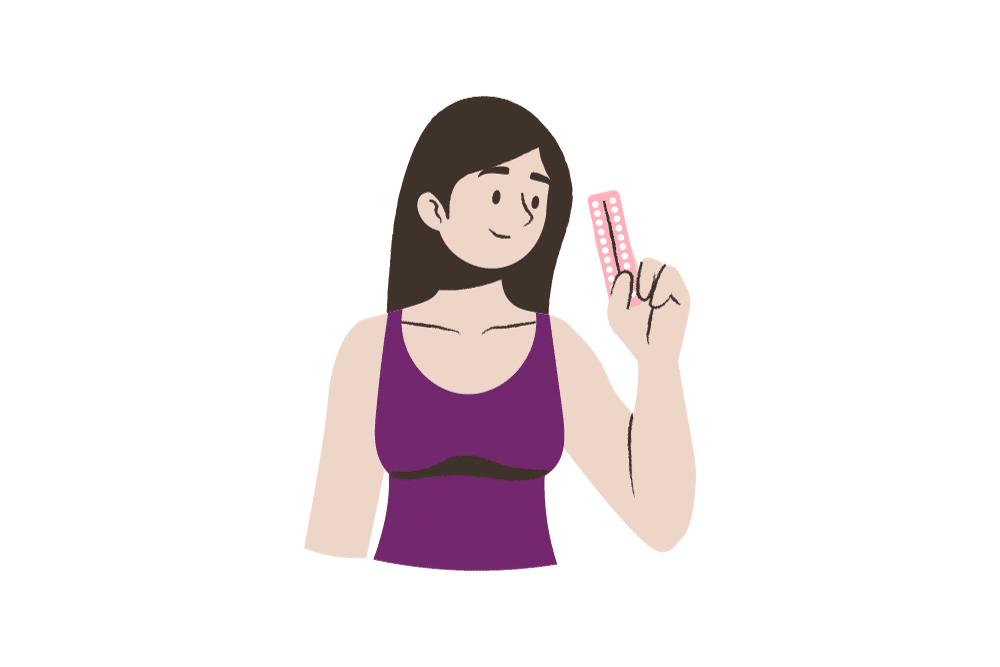When it comes to preventing pregnancy, having options is a powerful thing. Two commonly used tools in the contraceptive toolkit are “the pill” and the “morning-after pill.” But what happens when you consider using both together? Is it safe and effective to do so?
In this article, we explore the science behind these contraceptives. We’ll help you answer the question that might have crossed your mind: Can you take the morning-after pill when you’re already on the pill? Let’s dive into the facts and make sense of these two contraceptive methods so you can confidently navigate your sexual health.
Understanding “The Pill”
Birth control pills, often referred to as “the pill,” are a commonly used method of contraception. They come in a little package but pack a big punch in terms of preventing pregnancy. Let’s break down how the contraceptive pill works and explore the different types available.
How Birth Control Pills Work
In simple terms, birth control pills are like tiny hormone powerhouses. Most birth control pills contain synthetic versions of two key hormones: oestrogen and progestin (or just progestin in some cases). These hormones work together to prevent pregnancy in a couple of ways:
- Stopping Ovulation: One of the primary mechanisms is to prevent your ovaries from releasing an egg each month. Without an egg to meet sperm, there’s no chance of pregnancy.
- Thickening Cervical Mucus: The pill thickens the mucus in your cervix, making it more difficult for sperm to travel through the cervix and reach an egg.
- Thinning Uterine Lining: Birth control pills can make the lining of your uterus thinner, which makes it less suitable for a fertilised egg to implant and grow.
By working on these multiple fronts, birth control pills create a robust defence against unplanned pregnancies. However, it’s essential to take them consistently and as directed to ensure their effectiveness.
Different Types of Birth Control Pills
Not all birth control pills are the same, and they can be broadly categorised into two types:
Combination Pills
These are the most common hormonal contraception and contain both oestrogen and progestin. They are taken daily for 21 or 28 days, followed by a pill-free or placebo pill week. Combination pills come in various brands and formulations, allowing you and your healthcare provider to find the one that suits you best.
Progestin-Only Pills
Sometimes called the “mini-pill,” these pills only contain progestin. They are a suitable option for people who may experience side effects from oestrogen or have specific medical conditions that prevent them from taking oestrogen. Unlike combination pills, progestin-only pills are taken every day without a placebo week.
The choice between these two types of birth control pills often depends on individual preferences, medical considerations, and your healthcare provider’s recommendations. Understanding how your specific pill works and adhering to the prescribed schedule are essential to ensure its effectiveness in preventing pregnancy.

What is the Morning-After Pill?
When it comes to contraception, sometimes life throws unexpected surprises. That’s where the morning-after pill, also known as the emergency contraceptive pill, can be a helpful backup plan. Let’s dive into what it is and how it differs from regular birth control.
An Emergency Contraceptive Option
The morning-after pill is precisely what its name suggests—a backup option to prevent pregnancy after unprotected sex, contraceptive failure, or in cases of sexual assault. It’s designed for those “uh-oh” moments when your regular birth control fails, or you didn’t use any at all.
Emergency contraceptive pills work by preventing or delaying ovulation (the release of an egg from the ovary) or by making it more challenging for sperm to fertilise an egg. If fertilisation has already occurred, it may interfere with the ability of the fertilised egg to implant in the uterus.
It’s important to note that the emergency pill is not intended for regular or ongoing use. It’s meant for occasional, unplanned situations where pregnancy prevention was not initially ensured.
How it’s Different from Regular Birth Control
The morning-after pill differs from your regular birth control methods in several key ways:
Timing: Regular birth control, like birth control pills, vaginal rings or IUDs, is taken or inserted consistently over time to provide continuous protection against pregnancy. The morning-after pill, on the other hand, is a one-time or two-dose emergency option and is not meant to be your primary means of contraception.
Effectiveness: While regular birth control methods are highly effective when used correctly, the effectiveness of the morning-after pill decreases the longer you wait to take it after unprotected sex. It’s most effective when taken as soon as possible. However, it can still be useful within a limited time frame (typically up to 72 hours or even longer, depending on the specific product).
Regularity: You can use the morning-after pill only when needed, as opposed to regular birth control methods that require consistent use. It’s not a daily regimen.
Cost: In many places, the morning-after pill is available without a prescription and can be purchased over the counter (psst – you can also get the morning after pill online now). Regular birth control methods may require a prescription and involve ongoing costs.
Understanding the purpose and usage of the morning-after pill is key for making informed decisions about your reproductive health. The emergency contraception pill is a valuable option to have in your toolkit, but it’s not a substitute for regular, reliable contraception.

Using Both Pills Together
When it comes to contraception, you might wonder about the possibility of using regular contraceptive pills and emergency contraception pills together.
Why You Might Think About Using Both:
Missed Birth Control Pills
Sometimes, life gets busy, and you may forget to take your regular birth control pills as directed. If you’ve missed a few doses or haven’t been consistent with your daily pill, you might be concerned about the effectiveness of your primary birth control method.
Condom Breakage or Other Contraceptive Failures
Condoms can break, diaphragms can slip, and other contraceptive methods may fail on occasion. When these situations occur, you might want to take extra precautions to prevent an unintended pregnancy.
Back-Up Assurance
For some people, the peace of mind that comes from knowing they’ve taken additional steps to prevent pregnancy can be reassuring, especially after a contraceptive mishap or unprotected intercourse.
How Safe Is It to Use Both at the Same Time?
Using regular birth control pills and the morning-after pill together is generally considered safe. In fact, it can provide an additional layer of protection in certain situations. Here are some key points to consider:
No Harmful Interaction
There is no evidence to suggest that using both types of birth control pills together is harmful or dangerous. The morning-after pill typically works by delaying or inhibiting ovulation, while regular birth control pills aim to suppress ovulation. The two mechanisms are compatible and don’t interfere with each other.
Extra Assurance
Combining these methods can enhance your confidence in preventing pregnancy, especially if you’ve experienced a contraceptive failure or missed regular birth control pills. It’s a proactive approach to minimising the risk of unintended pregnancy.
Consult with a Healthcare Provider
If you’re unsure about using both types of pills together or have specific health concerns or conditions, it’s always advisable to consult with your healthcare provider. They can offer personalised guidance and address any potential issues.
Using regular birth control pills and the morning-after pill together can provide an additional layer of protection and peace of mind in situations where you’re concerned about the risk of unintended pregnancy. However, it’s essential to use emergency contraception as directed and consult with a healthcare provider if you have any doubts or questions about your circumstances.
How Well They Prevent Pregnancy
Understanding the effectiveness of birth control methods is crucial when making decisions about your reproductive health. In this section, we delve into how effective regular birth control pills and the morning-after pill are at preventing pregnancy and explore factors that can influence their effectiveness.
How Good They Are at Stopping Pregnancies
Regular Birth Control Pills
When taken perfectly and consistently, birth control pills are highly effective at preventing pregnancy. In fact, with perfect use (taking the pill at the same time every day without missing a dose), they can be up to 99% effective. However, typical use, which takes into account occasional missed doses or late pill-taking, tends to be around 91% effective.
The Morning-After Pill
The effectiveness of the morning-after pill depends on how soon you take it after unprotected sex. When taken within the first 24 hours, it is more likely to be effective, with a success rate of about 95%. The effectiveness gradually decreases with each passing hour and can be less effective if taken 72 hours or more after unprotected intercourse. On average, it is about 89% effective, but the sooner you take it, the better.
Things That Can Affect How Well They Work
Consistency: For regular contraceptive pills, taking your daily dose at the same time every day is vital. Missing a pill or taking it at irregular intervals can decrease its effectiveness.
Interaction with Other Medications: Some medications, like certain antibiotics and antifungals, can interact with birth control pills and reduce their efficacy. It’s essential to discuss potential drug interactions with your healthcare provider.
Vomiting or Diarrhoea: If you vomit or have severe diarrhoea shortly after taking a regular birth control pill, it may not be fully absorbed by your body, impacting its effectiveness. In such cases, a backup form of contraception may be necessary.
Body Weight: For some individuals, especially those with a higher body weight, the effectiveness of regular birth control pills and the morning-after pill may be reduced. Consult with your healthcare provider for guidance if you have concerns about this.
Timing of the Morning-After Pill: The effectiveness of the morning-after pill significantly depends on the time elapsed since unprotected intercourse. Taking it as soon as possible maximises its effectiveness.
Other Contraceptive Methods: The use of condoms or other contraceptives alongside birth control pills can provide extra protection and increase overall effectiveness in preventing pregnancy.
Understanding the effectiveness of regular birth control pills and the morning-after pill is essential for making informed decisions about contraception. Consistency, timing, and individual factors play significant roles in determining how well these methods work, and being well-informed can help you maximise their effectiveness in your specific situation.

Side Effects and Possible Problems
Regular birth control pills and the morning-after pill can come with side effects, and it’s important to be aware of these potential issues when considering their use. Common side effects of birth control pills include nausea, breast tenderness, and changes in menstrual bleeding. While most people tolerate them well, some may experience mood swings or headaches. It’s crucial to communicate any concerning side effects with your healthcare provider, as they can often suggest alternative pill formulations to alleviate these symptoms.
The morning-after pill can also lead to side effects such as nausea, vomiting, abdominal pain, and changes in your menstrual cycle. These side effects are usually temporary and mild. However, if vomiting occurs within two hours of taking the morning-after pill, it may not be fully effective, and another dose may be needed. Emergency contraceptive pills may also change the amount of bleeding for your next period, or make your period late or earlier. If your period is more than seven days late, lighter than usual or unusual in any other way, take a pregnancy test as soon as you can.
When using regular birth control pills and the morning-after pill together, you should be cautious about potential side effects, as they can compound. Always consult a healthcare professional for personalised guidance and recommendations tailored to your health needs and circumstances.









